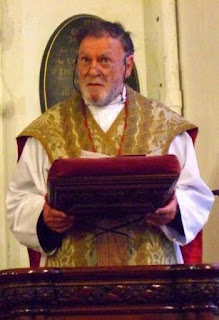To be "clear," that's Cardinal Cupich in red, and not Fr. George Rutler.
Here is what Fr. Rutler had to say about the "clarity" of Cardinal Cupich (emphasis added) at Crisis Magazine today.
Cardinal Blase Cupich of Chicago is all for clarity. It has been a consistent theme, as when in September of 2017 he issued a decree banning guns in all parishes, schools and other facilities across the archdiocese “so there would be absolute clarity on our position.” His official statement put “clarity” in italics. When he was bishop of Rapid City, he called for “civility and clarity” in discussing legislation that would limit abortion, but he was somewhat unclear in explaining that the law “must recognize both the suffering of the unborn children in abortion and the suffering of the pregnant women in dire circumstances.” The bill was defeated 55 percent to 45 percent. As bishop of Spokane, he spoke clearly in prohibiting the use of the traditional Latin liturgical books in the Paschal Triduum. He made very clear his disapproval of seminarians and priests demonstrating against Planned Parenthood: “Decisions about abortion are not usually made in front of clinics.” In 2012, his pastoral letter on a state referendum to legalize same-sex “marriage” said: “I also want to be very clear that in stating our position the Catholic Church has no tolerance for the misuse of this moment to incite hostility towards homosexual persons or promote an agenda that is hateful and disrespectful of their human dignity.”
Clarity requires effort because it requires honesty, which can be a costly commodity. So George Orwell said: “The great enemy of clear language is insincerity. When there is a gap between one’s real and one’s declared aims, one turns as it were instinctively to long words and exhausted idioms, like a cuttlefish spurting out ink.” Clear expression issues from clear thinking, which in turn requires conforming thought to reality. This was a primary concern of the Master in his holy agony, for he prayed to the Father that his Church never fudge the truth: “Consecrate them in the truth. Your word is truth” (John 17:17).
The Superior of the Society of Jesus, Fr. Arturo Sosa Abascal, seems wary about the unclear tenor of Christ’s teaching about marriage (Matt. 19: 3-9), because “no one had a recorder to take down his words.” Consequently, what Christ said must be “contextualized,” because human reality “is much more nuanced” and “never black and white.” Jesus did say, without the benefit of recorders other than the Evangelists: “Heaven and earth will pass away, but my words will not pass away” (Matt. 24:35). There is nothing nuanced about that, but Jesus was not a member of the Society of Jesus.
In an interview the day before he lectured on the exhortation of Pope Francis, Amoris Laetitia at the Von Hugel Institute for Critical Catholic Inquiry in Cambridge England, on February 9, Cardinal Cupich hoped that his words “might bring some clarity for people who have raised questions, and then also to raise a challenge for them to also take a second look at the document.” In the lecture itself the cardinal quoted Amoris Laetitia, n. 38: “Many people feel that the Church’s message on marriage and family does not clearly reflect the preaching and attitudes of Jesus, who set forth a demanding ideal yet never failed to show compassion and closeness to the frailty of individuals.” A year earlier, on February 14, 2017, Cardinal Cupich said that the pope’s exhortation “expresses with absolute clarity marriage doctrine in full fidelity to traditional Church teaching.” One supposes that Cardinal Cupich’s lecture in Cambridge was intended to explain why the Exhortation’s clarity was unclear to so many around the world, even though they have the benefit of recording machines and all the social media, which Jesus lacked, although his voice could be heard by thousands on hilltops and seashores
In the Von Hugel lecture, which was recorded and thus cannot be nuanced, Cardinal Cupich said by way of apophasis that “It goes without saying….” and then went on to say that Amoris Laetitia will also mean rejecting “an authoritarian or paternalistic way of dealing with people that lays down the law, that pretends to have all the answers, or easy answers to complex problems, that suggests that general rules will seamlessly bring immediate clarity.” There is clarity again, in all its frustrating opaqueness. And after rejecting authoritarianism and paternalism, the cardinal invoked Vatican II’s Dogmatic Constitution on the Church, n. 25 to declare that an innovative interpretation of Amoris Laetitia by the bishops of Buenos Aires, which, by virtue of “the publication in Acta Apostolicae Sedes [sic]” of the papal letter commending it, qualifies as an official Church teaching “which all are obliged to abide by and be in conformity with.”
It should be, and I think it is, clear as night and day, that Jesus would not have been crucified had he been more nuanced. There are those who have twisted themselves into pretzels trying to make clear by subtlety, with their own frail command of classical letters, that the official Latinity of Amoris Laetitia proves that it is faithful to authentic doctrine, and is not as flawed as its critics claim. This is on a par with Edgar Nye’s opinion that Wagner’s music is better than it sounds. Excuses like that are defeated by Pope Francis himself who told those Argentinian bishops that their eisegesis “explains precisely the meaning of Chapter VIII."
Cardinal Cupich called Amoris Laetitia a “radical change” and Cardinal Parolin said “It’s a paradigm shift and the text itself insists on this, that’s what is asked of us—this new spirit, this new approach!” The exclamation point conveys His Eminence’s enthusiasm. Cardinal Cupich asks for a more “holistic” application of the Gospel, in fact using the term ten times without a clear definition of what it means. There have indeed been paradigm shifters in Christology, but there have been no Doctors of the Church among them, and none has been salubrious in the annals of grace. To skim the surface, they have included Arius, Nestorius, Priscillian, Montanus, Mohammed, Waldo, Luther, Calvin, Jansen, Joseph Smith and Phineas Quimby who coached Mrs. Eddy.
Those who have studied the early Modernist period, might assume that the Von Hugel Institute has as its eponym the Baron Friedrich von Hugel, mentor of the Modernists Alfred Loisy and George Tyrrell. Actually, it was named for his brother, Anatole, who was a distinguished naturalist. The baron himself managed to keep his balance, while using the active if neurasthenic minds of younger theologians like guinea pigs, watching them degraded while maintaining his own claims to fidelity. The tedious von Hugel (even his English writings are cadenced as impenetrably German) visited John Henry Newman at least three times, and on each of these occasions he found Newman melancholy, concluding that Newman could not be a saint since saints must be joyful. “I used to wonder how one so good, and one who had made so many sacrifices to God, could be so depressing.” One biographer remarked with astuteness beyond the reach of the humorless baron, that the only evidence we have of Newman being demonstrably depressed was when he was visited by von Hugel.
This writer writes these words hastily, and knowingly exposes himself to imputations of illogic, irascibility and uncharity. Of only the last I vitally excuse myself, for I mean no irreverence or ill intent as a parish priest commenting on superiors. In the fullness of charity, I suppose that Cardinal Cupich is so occupied with the essential works of mercy incumbent upon a spiritual leader of many, that he may have availed himself of the advice of others inadequate to the task of preparing his attempts at clarification. The one complaint I invoke, albeit a strong one since much of my life’s studies have been nurtured by an intuitive friendship with John Henry Newman, who in an unworthy simile is to me as Philip Neri was to him, is that Cardinal Cupich has cited Newman on conscience to represent the very opposite of what Newman lived and exhausted himself to declare: that conscience must be informed by the Holy Ghost and not left to wander about like a ghost of the subjective human ego, validating uninformed impulses. In his Letter to the Duke of Norfolk, Newman distinguished between the operation of conscience and the exercise of private judgment. Such distinctions may be too delicate for hasty doctors of theology, but they are matters for which men were made martyrs. Errors must not be the template for the formation of consciences innocent and malleable. Chesterton warned: “The more doubtful we are about whether we have any truth, the more certain we are (apparently) that we can teach it to children. The smaller our faith in doctrine, the larger is our faith in doctors.”
In his revision of the Arians book, Newman explained in more detail what he meant by consulting the faithful on doctrine, and it is far different from soliciting the views of confused people who think truths are ideals beyond their reach. As a beacon of clarity, Newman knew that Christ is a Saviour and not an Idealist. The word “consult” is, in its Latin root, to consult with or to take counsel in the sense of submission to a truth, as one consults a barometer or takes one’s pulse. Newman said this himself. Conscience is not a license for invention or epistemological fabrication, and consultation of the faithful is not a survey to warrant a “paradigm shift.” Ronald Knox prefaced his translation of the Bible: “The teaching office of the Holy Spirit does not consist in imparting to the Church the knowledge of hitherto unknown doctrines, in addition to the deposit of faith, but in making our knowledge of doctrines already revealed fuller and more precise.”
Cardinal Cupich likes the term “cherry picking” as a reproach. On February 1 in Holy Name Cathedral, as he had done in 2004 in Rapid City, he faulted Pro-Lifers for “cherry-picking” instead of accepting the entire “seamless garment” theory. In 2017, he spoke against “cherry picking” in immigration issues. But Amoris Laetitia cherry picks in citing only one part of the Summa Theologica II-II, q. 140, in a way that posits the exact opposite of what Aquinas meant, just as Cupich cherry picks Newman on the “aboriginal vicar of Christ.” Cupich cites Gaudium et Spes,” n. 16 which calls conscience “the most secret core and sanctuary of a man … (where) he is alone with God, whose voice echoes in his depths.” As Newman was one of the greatest masters of English prose, that kind of lame poesie would have appalled him. It also is sourced from a document parts of which Pope Benedict once called downright Pelagian.
The clarification of doctrine is a risky business. In his novel Loss and Gain, Newman invented a “little, prim, smirking” character, a preacher in Oxford University named the Reverend Dr. Brownside: “As a divine he seemed never to have had any difficulty in any subject; he was so clear or so shallow that he saw to the bottom of all his thoughts: or, since Dr. Johnson tells us that “all shallows are clear,” we may perhaps distinguish him by both epithets.”
Let us be perfectly clear: Dr. Brownside existed only as a sketch on paper, unlike the Bridegroom of the Church who, even without the corroboration of a recording machine, is believed to have “taught as one having authority and not as the scribes.”


















